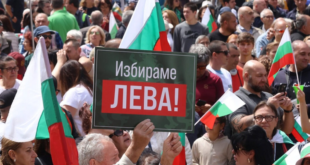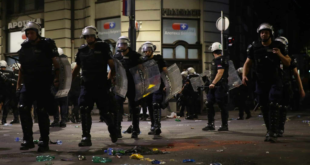BELGRADE – Serbs face a choice between a nationalist who leans towards Russia and a liberal favoring the West in a presidential election run-off next month.
Both candidates oppose independence for the breakaway province of Kosovo, expected to be declared soon after the second round vote with the backing of the West.
Nationalist challenger Tomislav Nikolic took 40 percent in Sunday’s first round, according to final results, ahead of 35.4 percent for pro-Western President Boris Tadic.
The two men will compete in a February 3 run-off, a repeat of the 2004 race which Tadic won with 53.2 percent.
Analysts said Sunday’s 61 percent turnout — strong by Serb standards and the highest since the fall of Slobodan Milosevic in 2000 — showed how seriously people took the vote. Turnout could be even higher on February 3.
The election comes at a pivotal moment for Serbia as it faces the loss of its historic heartland Kosovo where the Albanian majority is seeking independence.
The second-round will require a “maximum mobilization by both candidates”, analyst Zoran Stojiljkovic told Belgrade daily Danas. “We can expect a tight race and a decision in photo-finish, with Tadic having only a slight lead.”
Tadic has warned of dark days if Nikolic wins and in effect has the backing of the European Union, which on Monday said it was “confident that Serbia will continue to pursue its European course.”
“Serbs will have to choose between two concepts, for Europe or against it,” Tadic said on Monday. “There is no third way.”
Nikolic denies accusations of isolationism and warmongering.
He is lukewarm towards EU membership and argues that Serbia can steer a middle course between the bloc and Russia, Serbia’s only ally in seeking to stop the loss of Kosovo.
“Serbia voted today for both Europe and Russia,” he told state broadcaster RTS. “The road to Russia is at this moment more open, and I’ll open the road to the European Union.”
RUSSIAN BACKING
Nikolic’s poll figures show he courted some moderate voters successfully. But some saw his restraint as short-lived.
“Nikolic would be an utterly bad option,” said Andjelko Milardovic of Croatia’s Centre for Political Studies. “The fact that he has renounced the Greater Serbia idea is a marketing ploy, to deflect criticism from the West.”
Serbia was not a close ally of Moscow in the days of the Soviet Union, but Russian backing over Kosovo has reinvigorated feelings of Slavic brotherhood against the West.
To win the second round, the candidates must also attract third party votes with promises of growth and jobs, as well as promising to keep Kosovo.
Tadic strongly backs joining the EU, despite most EU members and Washington planning to recognize Kosovo within months.
Many Serbs feel the country has paid enough for its role in the Yugoslav wars of the 1990s, but most want EU membership. The question is whether their resentment is greater than the allure of EU-fostered economic development.
In the run-off, analysts think supporters of pro-Western candidate Cedomir Jovanovic will vote for Tadic while Nikolic would pick up roughly the same share of the vote from Milutin Mrkonjic, candidate of Milosevic’s once-mighty Socialist Party.
The outcome could well be in the hands of nationalist Prime Minister Vojislav Kostunica, backer of third-placed Velimir Ilic. Kostunica is Tadic’s partner in Serbia’s fragile coalition government but favors a hard line against the EU over Kosovo and is keen on closer political and economic ties with Moscow.
“Kostunica is again in a position to decide the fate of the country,” analyst Milan Nikolic said.
 Eurasia Press & News
Eurasia Press & News



